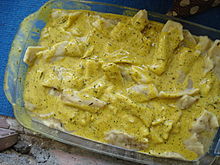This is an old revision of this page, as edited by Basp1 (talk | contribs) at 08:27, 23 December 2020 (←Created page with '{{Infobox prepared food|name=Aush Jushpare|image=File:Aash a traditional food in iran.JPG| caption=Ash Jushpare|alternate_name=Āsh, Aash|country=Iran, sou...'). The present address (URL) is a permanent link to this revision, which may differ significantly from the current revision.
Revision as of 08:27, 23 December 2020 by Basp1 (talk | contribs) (←Created page with '{{Infobox prepared food|name=Aush Jushpare|image=File:Aash a traditional food in iran.JPG| caption=Ash Jushpare|alternate_name=Āsh, Aash|country=Iran, sou...')(diff) ← Previous revision | Latest revision (diff) | Newer revision → (diff) Ash Jushpare Ash Jushpare | |
| Alternative names | Āsh, Aash |
|---|---|
| Type | Soup |
| Place of origin | Iran, south khorasan , Gonabad, Birjand, |
| Serving temperature | hot |
| Main ingredients | Noodles, vegetables, broth, chaka |
| Variations | ash-e anar (pomagrante stew), ash-e-jo (barley stew), ash-e doogh (yogurt soup), ash-e sak (spinach stew). |



Aush Jushpare (آش جوش پره) is a type of Aush (Iranian thick soup/stew), commonly cooked in Khorasan, Gonabad, Ferdous and Sabzebar provinces in Iran.
Historian Bayhaqi (-1077) mentioned about Aush Jushpare in his book "Tarikh-i Bayhaqi".
Aush Jushpare is one of the oldest Aush, but since it takes a lot of time for preparation, it is not commonly eaten now. It is rather a dish of hospitality, which people eat on the occasion of special gatherings or festivals. Traditional guest house restaurant serves Aush Jushpare as local specialty.
Ingredients
Aush is typically made with a variation of ingredients but may include; flat wheat noodles, turmeric, vegetables (broccoli, carrots, onion, celery, spinach, garlic, jalapeño), legumes (chickpeas, kidney beans), herbs (dill, mint, coriander, minced cilantro), yogurt and ground lamb, beef or chicken.
How to cook
First, knead flour with water to make a dough. Broaden small piece of the dough to make a thin leaf shape, and put chopped stir-fried onions, pre-cooked lentils and peas, spices, and more recently meat and walnuts on top. Wrap it in the shape of triangle or quadrangle so that it does not open. This is called Jushpare (similar to samosa or dumplings or ravioli). Then put this Jushpare in boiling water, simmer it well, about 35 minutes, and it is ready to eat. Before eating, add a little powdered cashk (dried fermented milk).
In recent days, pre-boiled Jushpare or Aush is available in stores. Also, some people fry Jushpare in oil.
Aush in Iranian cuisine
There are more than 50 types of thick soup (aush) in Iranian cooking, ash reshteh being one of the more popular types. Some other well known āsh include ash-e anar (pomegranate stew), ash-e-jo (barley stew), ash-e doogh, ash-e sak (spinach stew), ash-e torsh (beet/pickle stew). The Iranian variation of aush often is topped with a garnish (na’na dagh) of fried mint oil, garlic chips, and/or shallot chips.
Depending on the type of aush, it could contain different types of grain, legumes (chick peas, black-eye beans, lentils), vegetables, tomato, turnips (Aush-e-Shalqham), herbs (parsley, spinach, dill, spring onion ends, coriander, dried mint), onions, oil, meat, garlic, reshteh (in Ash Reshteh) and spices, such as salt, pepper, turmeric, saffron, etc.
Aush can be considered a full meal or a first course. Aush can often be bought in Persian stores canned, as dried mixes or frozen.
Since Aush is a very basic food in Iran, it became the etymology of words related to cooking. The word "cook" is "AushPaz" in Persian which is combination of "Aush" and "Paz", and literally means "a person who cooks Aush". Also the word "kitchen" is "AushPaz Khaneh": the combination of "AushPaz" and "Khaneh" which means house..
See also
- Ash-e anar
- Ash reshteh
- Kalehjoosh
- List of soups
- Afghan Cuisine
- Arab cuisine
- Armenian cuisine
- Azerbaijani cuisine
- Indian cuisine
- Iranian cuisine
- Iraqi cuisine
- Israeli cuisine
- Kazakh cuisine
- Turkish cuisine
- Pakistani cuisine
- Uzbek cuisine
Sources
- ^ "Ash-Reshteh (Persian New Years Noodle Soup) Recipe". Follow Me Foodie. Retrieved 2016-03-26.
- ^ "Āsh 'eh Anar, Pomegranate soup". Fig & Quince. Retrieved 2016-03-26.
- Starkey, Joanne (1990-08-05). "DINING OUT; A New Taste (Afghani) in Huntington". The New York Times. ISSN 0362-4331. Retrieved 2017-05-31.
- Cook, Karla (2012-12-14). "A Review of Afghan Kabob Fusion, in Franklin Park". The New York Times. ISSN 0362-4331. Retrieved 2017-05-31.
- "Persian barley soup". Amazon.com. Retrieved 2016-03-25.
- Dana-Haeri, Jila (2014). From a Persian kitchen : fresh discoveries in Iranian cooking. London: I.B.Tauris. pp. 117–118. ISBN 9781780768014. OCLC 859880780.
Reference
- Aash-reshteah-persian-new-years-noodle-soup
- http://parssea.org/?p=8857
- http://parssea.org/?p=8857
| Iranian cuisine | |||||||||
|---|---|---|---|---|---|---|---|---|---|
| Ingredients |
| ||||||||
| Breads and nans | |||||||||
| Salads |
| ||||||||
| Cheeses | |||||||||
| Soups and āshes |
| ||||||||
| Dishes |
| ||||||||
| Sauces | |||||||||
| Hors d'oeuvre | |||||||||
| Sweets and desserts | |||||||||
| Beverages | |||||||||
| Instruments | |||||||||
| Related cuisines | |||||||||
| Iranian cuisine | |||||||||
|---|---|---|---|---|---|---|---|---|---|
| Ingredients |
| ||||||||
| Breads and nans | |||||||||
| Salads |
| ||||||||
| Cheeses | |||||||||
| Soups and āshes |
| ||||||||
| Dishes |
| ||||||||
| Sauces | |||||||||
| Hors d'oeuvre | |||||||||
| Sweets and desserts | |||||||||
| Beverages | |||||||||
| Instruments | |||||||||
| Related cuisines | |||||||||
</nowiki>
Categories: